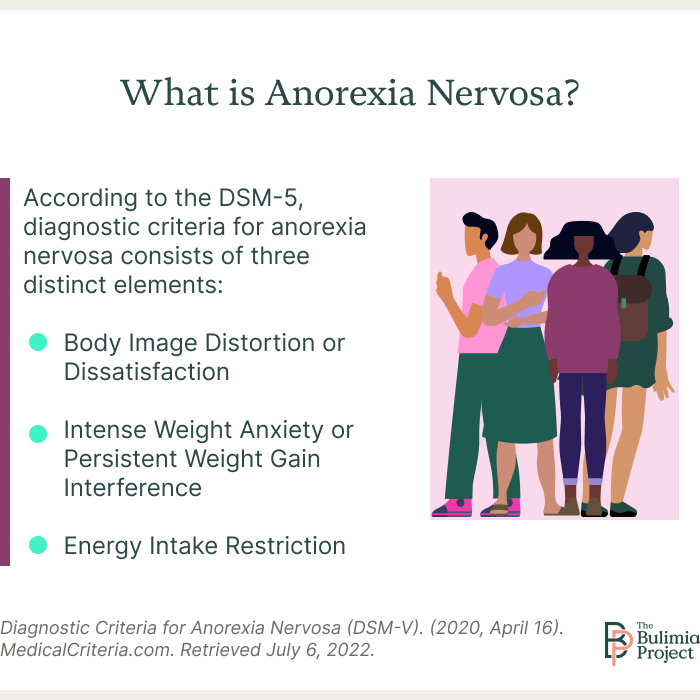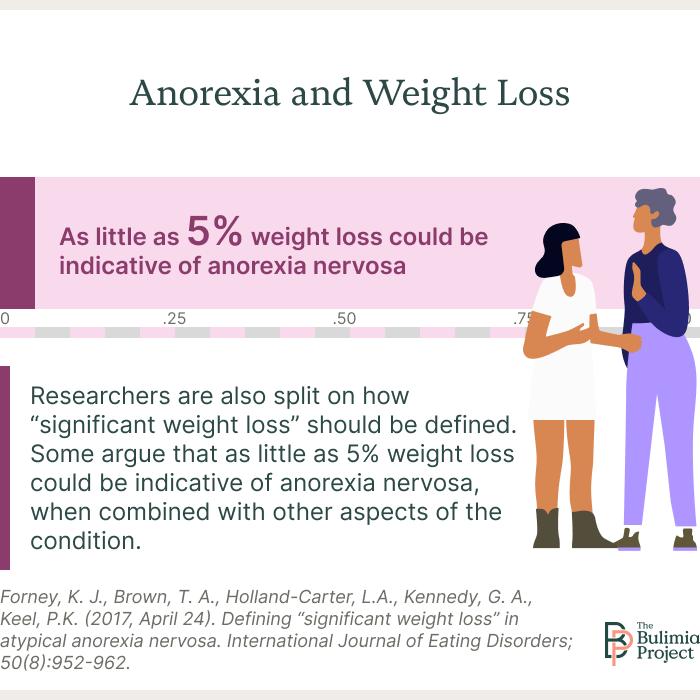The long answer is atypical anorexia is actually more common than anorexia and just as serious. People with this eating disorder still experience most of the symptoms typically associated with anorexia. But because we usually associate anorexia with a person being “underweight” or having significantly low body weight, atypical anorexia nervosa often goes underdiagnosed and underrated, and fewer patients receive treatment. Research indicates the need for fine-tuning diagnostic definitions, more diversity in atypical anorexia studies, and more screening and referrals for this vulnerable population.1
What is Anorexia Nervosa?
The Diagnostic and Statistical Manual of Mental Disorders (DSM) is the manual medical professionals generally use to diagnose mental health disorders. Created with the contributions of over 200 experts, it represents the official record of all currently recognized mental health disorders, including different eating disorders.
According to the DSM-5, the most recent version of the manual, diagnostic criteria for anorexia nervosa consists of three distinct elements:2
- Energy intake restriction
- Body image distortion or dissatisfaction
- Intense weight anxiety or persistent weight gain interference

People with anorexia nervosa generally have a distorted sense of their own body, often perceiving their weight, shape, and body size to be much different than it actually is.
Generally, this is coupled with negative body image and low self-esteem, with the person viewing themselves in an unfairly harsh light. People with anorexia also tend to fixate on this topic, with outsized concern over body weight, shape, and size, as well as food, marking another common sign of the condition.
People with anorexia nervosa commonly have intense anxiety around weight gain, far beyond what might be considered a healthy concern for one’s health and appearance.
People with this condition may take weight gain personally, perceiving it as a major failing, or seek to lose as much weight as possible, often setting unsafe weight loss goals or attempting to lose weight indefinitely.
This anxiety will frequently manifest as something called persistent weight gain interference. This symptom describes someone who actively tries to avoid weight gain by almost any means, including disordered eating behaviors.
Anorexia nervosa is largely driven by energy intake restriction or limiting caloric intake relative to what is otherwise understood as the required levels for someone’s specific age, height, sex, developmental trajectory, physical health, level of activity, and other factors.
In other words, someone who struggles with anorexia ingests fewer calories on a regular basis than their body needs to continue functioning in a healthy way. They severely limit the amount and types of food they eat. This behavior is often combined with extreme exercise to further burn off energy, which leads to dangerous and rapid weight loss.
Being Anorexic and Fat, or “Overweight”
Many aspects of anorexia nervosa commonly lead to a decline in weight. However, that is not always the case when it comes to this condition.
Atypical anorexia nervosa can impact people who present as at or above a “normal” weight range yet who still struggle with the common signs and symptoms of AN.
Shared Physical Signs and Symptoms
Significant weight loss can still occur in individuals with atypical AN, though they will remain in a “normal” or “above-normal” weight range. This may be due to the person starting off at a higher weight, making it more difficult to detect the effects of atypical eating behaviors, which is due to weight bias, weight stigma, or fatphobia, which themselves can lead to eating disorders in fat people or those who live in larger bodies.3
Researchers are also split on how “significant weight loss” should be defined. Some argue that as little as 5% weight loss could indicate anorexia nervosa when combined with other aspects of the condition.4

Regardless, the disordered eating patterns of someone struggling with atypical anorexia still lead to malnutrition. Cisgender women may stop menstruating, and a loss in bone density may also be detected, among other signs.5
Shared Psychological Signs & Symptoms
Many of the psychological effects of anorexia nervosa also carry through for those with atypical anorexia.
People struggling with this condition are equally as likely to experience intense fear and anxiety, negative body image, and a distorted perception of their body shape, weight, and size. And people with atypical anorexia also frequently fixate on the subjects of weight, body image, and food.5
Unfortunately, people who present as fat or in larger bodies but struggle with anorexia nervosa are often misunderstood—and sometimes misdiagnosed.3
Many practitioners may focus too much or exclusively on weight barometers, missing the psychological symptoms or even the signs of malnutrition in someone in a larger body. If you or a loved one are showcasing signs or symptoms of disordered eating, asking some questions may help you better understand what’s going on.
Warning Signs that Someone May Have Anorexia While “Overweight” or Fat
Along with the shared signs and symptoms of anorexia nervosa and atypical anorexia, there are a number of other factors that may point to someone struggling with the condition, including:6
- Unusual eating habits, such as cutting food into small pieces and moving it around their plate instead of actually eating it
- Going to the bathroom immediately after meals
- Refusing to eat around other people
- Using diuretics or laxatives excessively
- Blotchy skin
- Dry mouth
- Extreme sensitivity to cold
- Osteoporosis
- Depression
- Confusion or difficulty thinking clearly
- Poor memory
People who experience atypical anorexia nervosa may also turn to unhealthy exercise habits in an attempt to control weight. This could look like overexercising, exercising in secret, or failing to adjust their food intake to their level of activity.7
While our society typically associates exercise with improving health, taking it to the extreme can be dangerous. Excessive exercise habits can harm someone’s physical health, mental health, and/or life balance and actually damage a person’s body under the wrong circumstances.
Talking to a Loved One About Anorexia
Talking to a loved one about any disordered eating behavior is difficult. But this can be especially hard when discussing atypical anorexia, as the condition is less commonly recognized.
Before talking to your loved one, it’s helpful to research the subject so you can come into the conversation more well-informed. Many people with atypical anorexia nervosa may struggle to understand that it’s possible to have an eating disorder while presenting in a larger body.
What to Expect
It may take multiple conversations to get a person to understand and admit they have an eating disorder.
Generally, it’s advised to have these conversations in a private and comfortable place for your loved one. Their home—or their room, if you live together—may be a good setting to help ensure they’re as relaxed as possible during this difficult discussion.
The stress of the situation could lead to your loved one reacting negatively. Many people grow angry and defensive when approached about disordered eating behavior.
It’s important that you don’t respond with anger if this occurs and to avoid using judgmental language or talking about food or their eating habits. Instead, focus on how you care about your loved one and let them know you’re concerned about their mental and physical health.
Finding Help
It may also be beneficial to come to the conversation with some ideas about how to help.
As a non-professional, you may be limited in how much you can personally do. Instead, you can gently recommend your loved one to speak with a mental health professional or other healthcare provider who has expertise in eating disorders or perhaps go to a treatment facility where they can get expert help, depending on the severity of their disordered eating patterns.
You can research options online. Make sure to keep in mind several potential priorities, including where the professionals or centers are located, their cost, the insurance they accept, and the type of therapy they utilize.
While recovering from anorexia can be a long process, choosing to seek professional help is a huge milestone. It is the first step toward recovery and a healthier, happier future.
Resources
- Stice E, Marti CN, Rohde P. (2013). Prevalence, incidence, impairment, and course of the proposed DSM-5 eating disorder diagnoses in an 8-year prospective community study of young women. Journal of Abnormal Psychology; 122(2):445-57.
- Diagnostic Criteria for Anorexia Nervosa (DSM-V). (2020, April 16). MedicalCriteria.com. Retrieved July 6, 2022.
- Alberga AS, Russell-Mayhew S, von Ranson KM, et al. (2016). Weight bias: a call to action. Journal of Eating Disorders; 4(34).
- Forney KJ, Brown TA, Holland-Carter LA, Kennedy GA, Keel PK. (2017). Defining “significant weight loss” in atypical anorexia nervosa. International Journal of Eating Disorders; 50(8):952-962.
- Leigh S. (2019, November 6). Anorexia Nervosa Comes in All Sizes, Including Plus Size. University of California San Francisco. (2019, November 6). Retrieved July 6, 2022.
- Anorexia. (2020, May 10). National Library of Medicine. Retrieved July 6, 2022.
- Unhealthy Exercise. (2018, January 25). Center for Clinical Interventions. Retrieved July 6, 2022.